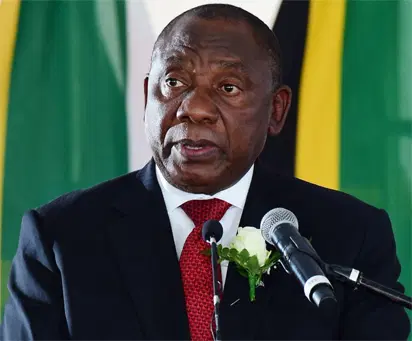South African President Cyril Ramaphosa has hit back at sharp criticisms from U.S. President Donald Trump and tech mogul Elon Musk, who recently made inflammatory remarks about South Africa’s controversial land expropriation policy. Both figures have accused the South African government of land confiscation and racism, igniting a heated diplomatic exchange.
The controversy erupted when Trump, without providing evidence, tweeted on Sunday that “South Africa is confiscating land” and unfairly targeting “certain classes of people.” In an escalating threat, he declared that the U.S. would cut all future funding to South Africa until a full investigation into these allegations was carried out.
“I will be cutting off all future funding to South Africa until a full investigation of this situation has been completed!” Trump’s tweet read, setting the stage for a dramatic international response.
Ramaphosa quickly rebutted the accusations, labeling them as inaccurate and misleading. He emphasized that South Africa’s new land law was not aimed at land theft or unjust expropriation but was part of an effort to correct the historical wrongs of apartheid-era land dispossession.
“There is no land confiscation,” Ramaphosa stated firmly in a televised address. “The government is working within a legal framework established by our constitution, which allows land expropriation under specific, justifiable circumstances. This law does not violate property rights but ensures that land is accessed equitably.”
This legal shift, known as the Expropriation Act, was signed into law in January 2025 and aims to address lingering racial disparities in land ownership that remain a painful legacy of apartheid. The law allows for land to be expropriated in the public interest, but only after meeting strict conditions such as under-utilization or long-term occupation by informal settlers.
In a bid to reassure the international community, Ramaphosa also pointed out that U.S. aid plays a vital role in South Africa’s public health initiatives, notably HIV/AIDS treatment programs. Last year, the U.S. allocated nearly $440 million in assistance to South Africa, with $315 million of that funding earmarked for HIV/AIDS initiatives.
“The United States is an important partner in addressing public health challenges, but we cannot allow misguided claims to undermine the efforts that have been put in place to ensure justice for all South Africans,” Ramaphosa remarked, responding to Trump’s threats.
In a show of continued support for South Africa, Ramaphosa urged constructive dialogue, welcoming discussions with Trump to clarify the country’s intentions. He further emphasized that South Africa would not allow the distortion of its policies for political purposes.
Meanwhile, Musk, the South African-born billionaire and CEO of X (formerly Twitter), stirred the pot further with a post on the social media platform. Musk, who has a massive global following, chimed in, accusing the South African government of fostering “openly racist ownership laws” in relation to the land expropriation debate.
“Why do you have openly racist ownership laws?” Musk tweeted in response to a presidency statement from Ramaphosa, questioning the fairness of the country’s land policies.
Ramaphosa’s spokesperson, Vincent Magwenya, urged Musk to engage in a more informed and respectful dialogue. “Elon, you understand the complexities of South Africa’s history, and we hope you can appreciate that our Constitution aims to heal wounds created by centuries of colonial oppression and apartheid,” Magwenya said.
The land reform debate in South Africa is deeply intertwined with the country’s past, marked by centuries of colonial exploitation and systemic racism that saw the majority Black population stripped of their ancestral lands. Even after the formal end of apartheid in 1994, the scars of land inequality persist, with the white minority still holding a disproportionate amount of land.
While the Expropriation Act has sparked significant controversy within South Africa’s political landscape, particularly among parties in Ramaphosa’s ruling coalition, it has also been backed by many who believe that the country cannot move forward without addressing the legacy of land dispossession. South African officials argue that such reforms are crucial for economic and social justice.
However, critics like Musk view the act as a form of institutionalized racism that unfairly targets white landowners. His statements, along with Trump’s inflammatory remarks, have contributed to a global perception of instability in South Africa, affecting investor confidence.
The South African rand saw a sharp drop of nearly 2 percent against the U.S. dollar following Trump’s statement, with the stock market and government bonds also experiencing losses. The threat to cut U.S. aid and possibly revoke trade privileges raised concerns among investors, who feared the potential fallout for the country’s fragile economy.
Charles Robertson, an emerging markets analyst at FIM Partners, weighed in on the economic impact of the diplomatic fallout. While he acknowledged that South Africa was less dependent on U.S. investments compared to China or Europe, he warned that Trump’s threats could harm the country’s international reputation.
“South Africa’s economic recovery and efforts to attract foreign investors will certainly be challenged if these tensions continue,” Robertson said. “What businesses will want to invest in a country where its relationship with the U.S. is uncertain? It’s a major concern.”
Despite the international pressure, Ramaphosa remains steadfast in his defense of the land reform law. He has called for an open and transparent conversation, where South Africa’s complex history can be fully understood and the real needs of its people addressed. The president has emphasized that the nation will continue to push for an equitable and peaceful society where the horrors of apartheid are acknowledged and corrected.

